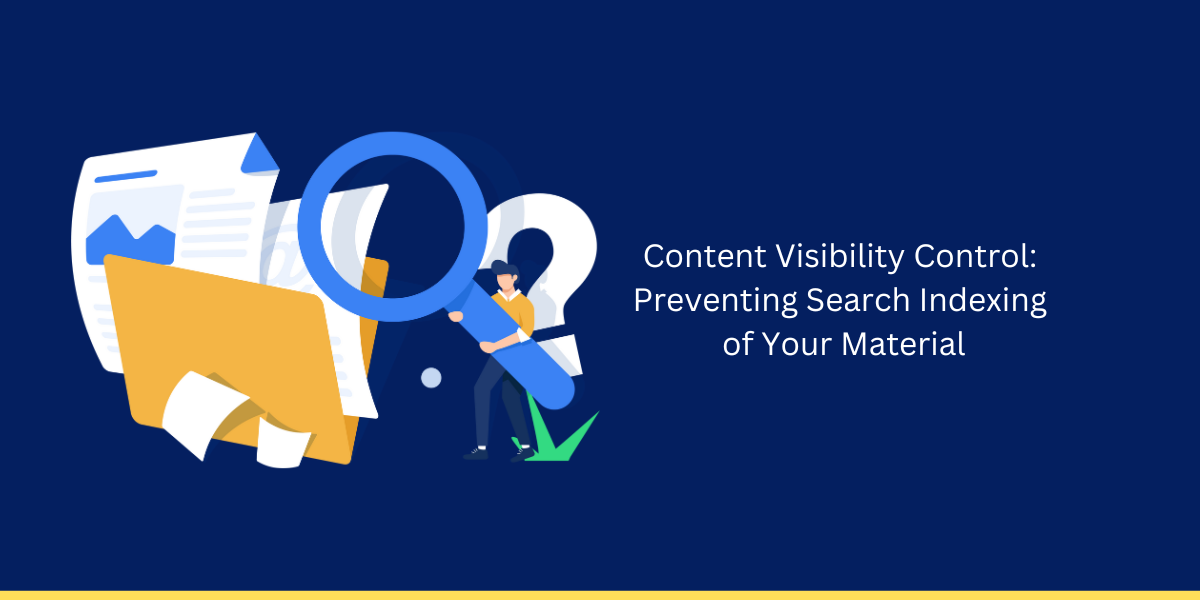
In 2023, you can exclude a webpage or other online resource from appearing in Google Search results. Google provides clear guidance on preventing a website from appearing in search results through three distinct methods, each suited to different scenarios and what aligns best with your website’s goals.
Why Consider Keeping Your Site Out of Search Engine Indexing?
Certain situations call for the desire to keep your website away from search engine indexes:
Work-in-progress websites – It’s prudent to withhold public access to your website while ironing out its imperfections.
Restricted access sites – For websites meant exclusively for invitees, their appearance on search engine results pages (SERPs) may not be desired.
Test environments – Publishers often create duplicate versions of their websites for testing and experimentation. Search engine indexing should be avoided because some sites are meant for a narrow audience.
John Mueller from Google provides insights into the strategies for preventing content from being indexed in search results and addresses the feasibility of implementing such practices.
He elucidates three methods that can be employed to ensure that content remains hidden from search engines while remaining accessible:
- Password Protection: Websites can choose to secure their content with a password, making it unavailable to the general public and search engines.
- Crawling Block: Blocking crawling means that search engines’ bots won’t explore the site’s content, keeping it off the radar.
- Indexing Block: Preventing indexing ensures that even if the content is crawled, it won’t be indexed in search results.
Notably, websites can entirely exclude their content from indexing or allow indexing while using a password to restrict access exclusively to desired users.
Mueller emphasizes that restricting content from Googlebot is permissible if the same restriction applies to users. If a site is password-protected during Googlebot’s crawl, it must maintain the same level of user protection. Alternatively, the website should implement specific directives to prevent Googlebot from crawling or indexing the content.
A cautionary note is given to websites that provide different content to Googlebot compared to what users see. Such practices can lead to issues and potential penalties.
Further exploration is warranted to gain a deeper understanding of these tactics and effectively prevent content from being indexed.
-
Secure your website with a Password
If you want to keep your website confidential due to any reasons, locking it down using a high security password is usually the best option.

As of 2023, search engines and casual internet users can be effectively blocked from accessing your content using a password. This measure ensures that your content remains undisclosed and won’t be indexed by search engines.
This practice is commonplace in web development, serving as a straightforward method to share ongoing work with clients while keeping search engines like Google from indexing a site that still needs to be ready for public viewing.
For those looking to adopt this approach, here’s a concise guide on implementing password protection:
Password Protection via cPanel:
- Access the “Directory Privacy” section within your cPanel account.
- Choose the leading directory that requires protection.
- Opt for the “Password-protect this directory” feature and assign a name to the guide.
- Save the settings and make a new user account for accessing the secured website.
Upon completing these steps, you’ll have successfully established password protection for your content, ensuring that it remains confidential and hidden from prying eyes, including search engines.
If you wish to know more about password protection click here.
Blocking Crawling
Another effective method to hinder Googlebot from accessing your website involves blocking crawling, which is accomplished by utilizing the robots.txt file.
The robots.txt file serves as a communication tool with search engine crawlers, explicitly indicating the URLs within your site that they are allowed to explore. Primarily, this protocol is designed to prevent the undue strain of excessive requests on your site’s resources. It’s important to note that this technique isn’t primarily intended as a strategy to exclude a web page from Google’s index; its primary function is to manage the flow of crawler traffic to maintain optimal site performance.
A robots.txt file is used primarily to manage crawler traffic to your site, and usually to keep a file off Google, depending on the file type.
According to Mueller, this isn’t the ideal choice because search engines may still index the website’s address without reading the content.
Although this is an unusual thing, BUT, it is something you should be aware of.
Block indexing
The final and third technique involves prohibiting search engines from crawling your website.
You can employ a noindex meta tag or include a corresponding header within the HTTP response to achieve this. This approach ensures that a page or resource won’t appear in Google Search results. When Googlebot re-evaluates the page and detects the noindex meta tag or the header, it will eliminate the content from Google Search results, irrespective of any external sites linking to it. This method provides a definitive way to exclude specific content from search visibility, rendering it absent from search engine indexes regardless of exterior linking.
Using noindex is useful if you don’t have root access to your server, as it allows you to control access to your site on a page-by-page basis.
Mueller concludes the video by stating that Google’s top suggestion is to use a password:
“Overall, for private content, our recommendation is to use password protection. It’s easy to check that it’s working, and it prevents anyone from accessing your content.
Blocking crawling or indexing are good options when the content isn’t private. Or if there’s just parts of a website which you’d like to prevent from appearing in search.”

